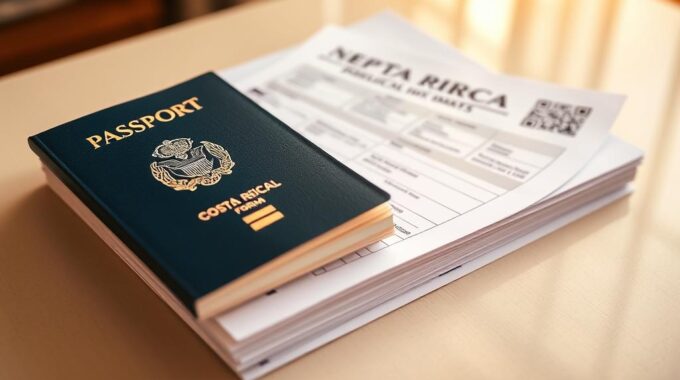Discover equity lending opportunities in Costa Rica real estate through GAP Investments. Private loans from $50,000 to $3,000,000 with interest rates from 12%.

How to Get Residency in Costa Rica: A Comprehensive Guide
Did you know that over 120,000 U.S. citizens currently call Costa Rica home? This tropical paradise attracts people with its stunning nature, vibrant culture, and relaxed lifestyle. For those planning to stay longer than 90 days, a residence permit is essential.
Navigating the process can be complex, but Costa Rica Immigration Experts (CRIE) make it easier. With 20 years of experience, CRIE offers personalized consultations to help applicants understand legal documents and application requirements. Whether you’re exploring the Pensionado, Rentista, or Inversionista programs, their expertise ensures a smooth journey.
For assistance, contact CRIE at +506 8706-3888, +506 8373 2085, or toll-free +1 305-906-6784 for USA/Canada. This guide will walk you through the steps, timelines, and benefits of obtaining residency in Costa Rica.
Overview of Costa Rica Residency Benefits
Living in Costa Rica means embracing a lifestyle surrounded by lush landscapes and vibrant traditions. This Central American gem is known for its natural beauty, friendly locals, and the iconic “pura vida” philosophy. Expats find it easy to adapt to the relaxed pace of life while enjoying modern amenities.
The country offers a range of benefits for those seeking residency. From access to high-quality healthcare to tax advantages, it’s a destination that caters to diverse needs. Families appreciate the excellent education system, while digital nomads and retirees find the environment ideal for their lifestyles.
Lifestyle, Nature, and Cultural Advantages
Costa Rica is a haven for nature lovers. With rainforests, beaches, and volcanoes, the country is a paradise for outdoor enthusiasts. The “pura vida” lifestyle emphasizes happiness, simplicity, and community, making it easy to feel at home.
Cultural richness is another highlight. Festivals, traditional cuisine, and a strong sense of heritage create a vibrant atmosphere. Expats often find themselves immersed in local customs, forming lasting connections with the community.
Pathways to Citizenship and Travel Opportunities
Residency in Costa Rica opens doors to citizenship. After seven years of residency, individuals can apply for naturalization. This process grants access to a passport that allows visa-free travel to over 150 countries.
Travel is also convenient with four international airports. Whether exploring the region or returning home, residents enjoy seamless connectivity. The country’s stable government and peaceful environment further enhance its appeal.
- Access to affordable, high-quality healthcare through the national insurance system.
- Tax benefits for residents, including exemptions on certain imports and income.
- Free schooling for dependents, making it a family-friendly destination.
- Business-friendly policies that attract entrepreneurs and investors.
Combining lifestyle, travel, and economic opportunities, Costa Rica offers a balanced living environment. Its unique blend of natural beauty and cultural richness makes it a top choice for expats worldwide.
Understanding Costa Rica Immigration Experts
For over two decades, Costa Rica Immigration Experts (CRIE) have been assisting individuals with seamless residency applications. With thousands of successful cases, CRIE has become a trusted name in navigating the complexities of immigration. Their expertise ensures that every applicant receives personalized support tailored to their unique needs.
Why Choose CRIE for Your Residency Journey
CRIE’s 20+ years of experience sets them apart. They understand the intricacies of the immigration process, from document legalization to visa processing. Their team works closely with government departments to ensure all requirements are met efficiently. This reduces legwork and speeds up the application process for residents.
Applicants benefit from CRIE’s in-depth knowledge of regulatory and legal aspects. Whether it’s translating documents or scheduling appointments with immigration authorities, CRIE handles it all. Their proven track record of success provides peace of mind to those seeking a new life in Costa Rica.
Consultation, Pricing, and Personalized Support
CRIE offers transparent pricing and cost-effective solutions. Their consultation process is simple and accessible via phone or WhatsApp. During these sessions, they assess individual needs, family sizes, and documentation requirements. This personalized approach ensures a smooth journey for every applicant.
- Expert guidance on document translation and notarization.
- Assistance with regulatory compliance and legal requirements.
- Timely consultations to address specific concerns.
- Proven success stories and testimonials from satisfied clients.
For those considering Costa Rican citizenship, CRIE provides invaluable support. Their expertise ensures that applicants meet all criteria, from proof of income to security clearances. With CRIE, the path to residency is clear, efficient, and stress-free.
How to get residency in Costa Rica
Starting the journey to live in Costa Rica begins with understanding the initial steps. The process involves applying for a provisional visa before arriving in the country. This visa is essential for transitioning to long-term residency.
One of the first requirements is ensuring all documents are translated and legalized. This includes proof of income, background checks, and other necessary paperwork. Meeting these requirements early can save time and prevent delays.
After arriving, applicants must register their fingerprints with immigration authorities. This step is mandatory and should be completed within the first few weeks. It’s also important to finalize the application within a 60-day window to avoid complications.
Key aspects of the process include:
- Submitting proof of income or financial stability.
- Ensuring all documents are properly translated and legalized.
- Registering fingerprints promptly after arrival.
- Meeting the 60-day deadline for application finalization.
Understanding these preliminary steps is crucial for long-term residency. Proper guidance can simplify the process, making it easier to navigate. For more details on financial requirements, visit this resource.
By following these steps and meeting all requirements, applicants can ensure a smooth transition to life in Costa Rica. The process is straightforward when approached with the right preparation and support.
Step-by-Step Guide to the Residency Application Process
Navigating the residency application process in Costa Rica requires careful planning and attention to detail. From obtaining a provisional visa to finalizing legal documents, each step is crucial for a successful submission. Below is a detailed guide to help you through the process.
Obtaining a Provisional Visa at the Consulate
The first step is securing a provisional visa from a Costa Rican consulate. This visa is essential for transitioning to long-term residency. Applicants must submit the following documents:
- Passport copies with at least six months of validity.
- Birth certificates and police clearances from their home country.
- Proof of financial stability, such as bank statements or income sources.
All documents must be less than six months old, translated into Spanish, and apostilled or legalized. The processing fee for the provisional visa is $50.
Registering Fingerprints and Document Translation
After arriving in Costa Rica, applicants must register their fingerprints at the Ministry of Public Security. This step is mandatory and should be completed within the first few weeks. Additionally, non-Spanish documents must be legally translated and notarized.
Once these prerequisites are met, the official residency application form can be completed. It’s important to ensure all information is accurate and consistent with the submitted documents. The fee for converting the provisional visa to a residency permit is $200.
Key tips for a smooth application process:
- Organize all documents in a complete package to avoid delays.
- Double-check translations and notarizations for accuracy.
- Submit the application within the 60-day window to prevent complications.
Following these steps minimizes delays and ensures a hassle-free submission. For more information on transitioning to Costa Rican citizenship, explore the detailed requirements and timelines.
Exploring Temporary and Permanent Residency Options
Costa Rica offers diverse residency options tailored to different lifestyles and goals. Whether you’re a retiree, an investor, or someone seeking a new adventure, there’s a pathway for you. Understanding these options is key to making an informed decision.
Temporary Residency: Pensionado, Rentista, and Investor Paths
Temporary residency in Costa Rica is available through three primary categories: Pensionado, Rentista, and Inversionista. Each option has specific requirements and benefits.
The Pensionado program is ideal for retirees with a steady income. Applicants must prove a minimum monthly pension of $1,000. This option offers perks like tax exemptions on imported household goods and discounts on healthcare services.
The Rentista program suits individuals with non-employment income. A minimum monthly income of $2,500 for two years is required. This option is popular among digital nomads and those with passive income streams.
The Inversionista program is designed for investors. A minimum investment of $150,000 in real estate or a business is necessary. This path appeals to entrepreneurs and those looking to contribute to the local economy.
Transitioning to Permanent Residency
After holding temporary residency for three years, individuals can apply for permanent residency. This status offers indefinite stay and unrestricted work opportunities. It’s a significant step toward long-term stability in Costa Rica.
Permanent residents enjoy benefits like access to the national healthcare system and the ability to include family members in their application. They also gain the option to apply for citizenship after seven years.
Key considerations for transitioning include maintaining compliance with income or investment requirements and ensuring all documents are up to date. Proper planning ensures a smooth process.
- Pensionado: $1,000 monthly pension, ideal for retirees.
- Rentista: $2,500 monthly income, perfect for digital nomads.
- Inversionista: $150,000 investment, tailored for entrepreneurs.
- Transition to permanent residency after three years.
- Citizenship eligibility after seven years of residency.
Choosing the right residency option depends on your financial situation and long-term goals. Each path offers unique advantages, making Costa Rica an attractive destination for expats worldwide.
Insights on Legal Requirements and Documentation
Understanding the legal requirements for residency in Costa Rica is crucial for a smooth application process. Proper documentation ensures that applications are processed efficiently, minimizing delays and complications. This section outlines the essential documents, notarization processes, and specific requirements for dependents.
Essential Documents and Notarization Process
Applicants must provide a variety of documents to meet the residency requirements. These include birth certificates, police clearances, notarized passport copies, and recently issued photos. All non-Spanish documents must be legally translated and certified.
The notarization process is a critical step. Passport copies and other vital records must be notarized to ensure their authenticity. This step is mandatory for all applicants, regardless of their residency type.
For those applying based on family or marital status, additional documentation is required. Marriage certificates and birth certificates for children must be included. These documents must also be translated and legalized.
- Valid passport with at least six months of validity.
- Birth certificates for all family members.
- Marriage certificate (if applicable).
- Clean criminal background check.
- Proof of financial stability.
The Costa Rican consulate and immigration department set strict standards for document submission. All documents must be less than six months old and properly apostilled or legalized. Updates to documents may be required periodically to maintain compliance.
Correct documentation is essential to avoid processing delays. Incomplete submissions can result in non-refundable fees and extended processing times. Examples of acceptable proof of income include bank statements, pension statements, or investment records.
Attention to detail is key for successful applications. Ensuring all documents are accurate and complete can make the process smoother. For more information on the social benefits of residency, explore this resource.
Leveraging Expert Guidance for a Smooth Transition
Many individuals have successfully transitioned to life in Costa Rica with the help of expert guidance. Navigating the residency process can be complex, but professional support ensures a seamless experience. From document preparation to legal compliance, experts like Costa Rica Immigration Experts (CRIE) have proven invaluable.
Case Studies and Success Stories
Real-life examples demonstrate the effectiveness of expert assistance. One applicant, a retiree, secured Pensionado residency with CRIE’s help. They provided step-by-step guidance, ensuring all documents were translated and legalized. This streamlined process allowed the applicant to focus on enjoying their new life.
Another case involved a digital nomad applying for the Rentista program. With expert advice, they navigated the income verification process effortlessly. Their spouse and children were also included in the application, showcasing the benefits of professional support for families.
Here are key takeaways from these success stories:
- Expert guidance simplifies complex documentation processes.
- Professional support ensures compliance with legal requirements.
- Families benefit from inclusive application assistance.
- Timely consultations prevent delays and errors.
These examples highlight the importance of working with experienced immigration experts. Their knowledge and resources maximize the chances of a smooth transition to residency. Whether you’re an individual or a family, professional assistance can make all the difference.
For those considering the Inversionista program, expert advice is equally crucial. One investor successfully navigated the $150,000 requirement with CRIE’s support. They ensured all investment records were accurate and compliant, paving the way for permanent residency.
In conclusion, leveraging expert guidance ensures a stress-free residency journey. Real-life case studies demonstrate the value of professional support in achieving your goals. With the right assistance, transitioning to life in Costa Rica becomes a rewarding experience.
Conclusion
Securing long-term stability in a new country requires careful planning and expert guidance. The process involves applying for a provisional visa, meeting income requirements, and submitting essential documents. Choosing the right pathway, whether as an investor, retiree, or digital nomad, ensures a smooth transition.
Working with immigration experts like CRIE simplifies the application process. They provide personalized support, ensuring compliance with legal requirements and minimizing delays. From document preparation to finalizing the permit, their expertise is invaluable.
Residency offers numerous benefits, including access to healthcare, tax advantages, and travel opportunities. With proper planning and professional assistance, applicants can achieve their goals and enjoy a fulfilling life in their new home.


